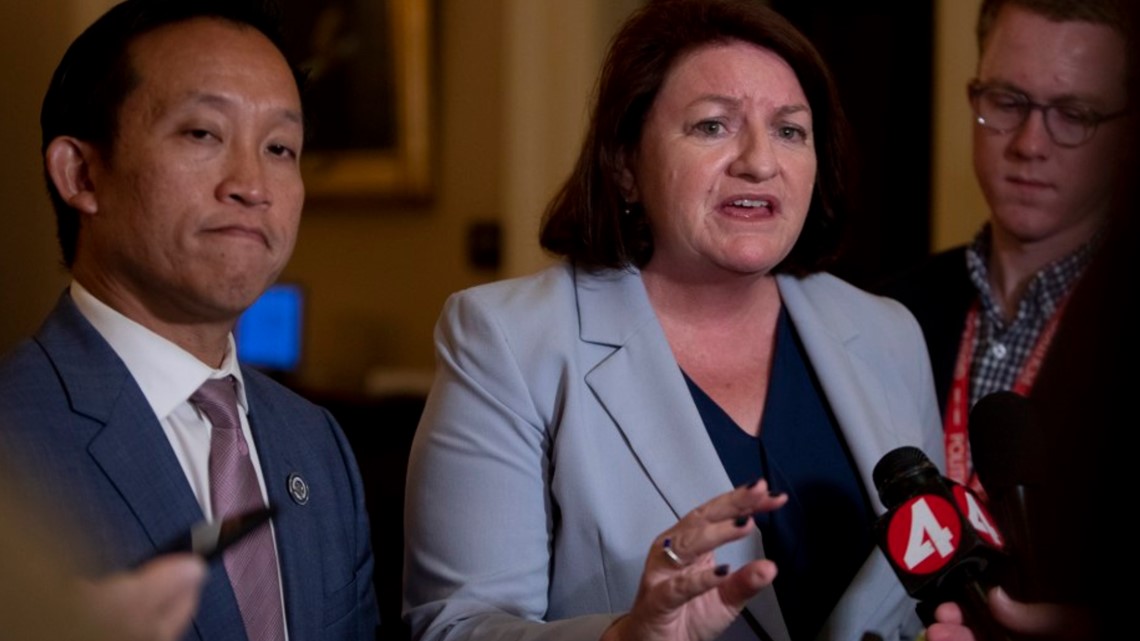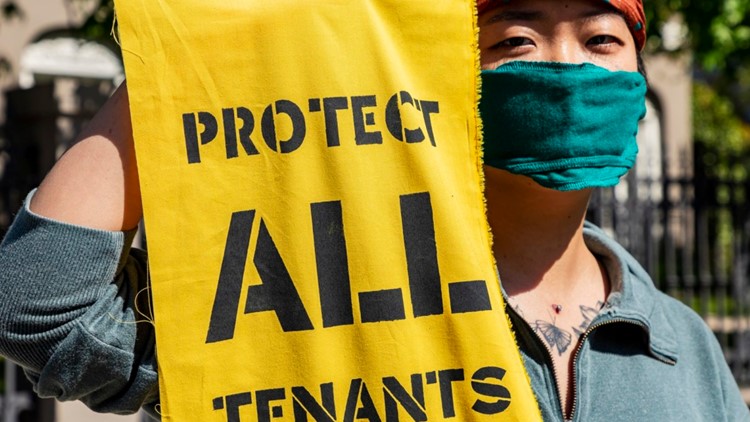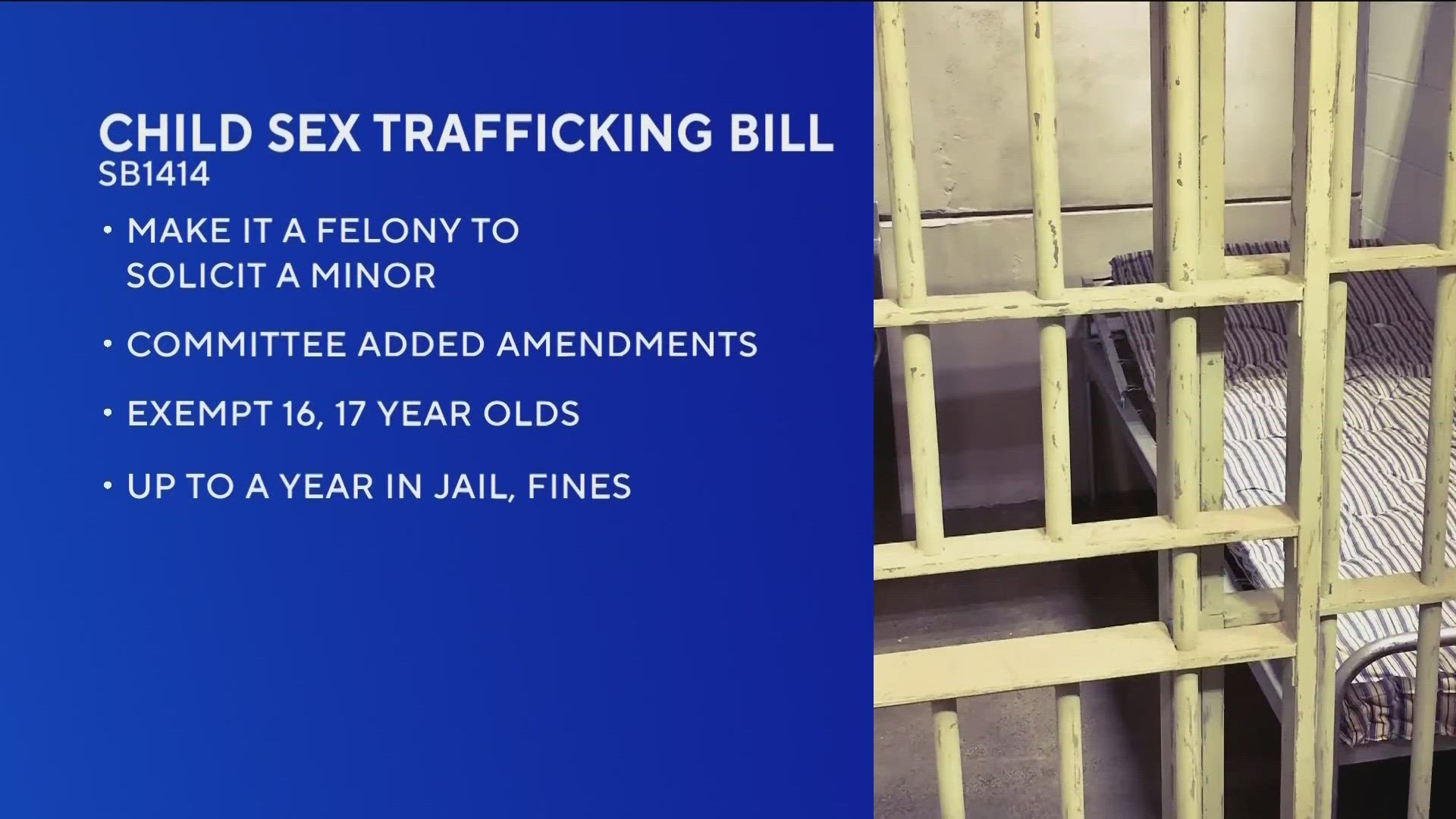CALIFORNIA, USA — Governor Gavin Newsom doesn’t want it to happen. Neither do powerful leaders in the state Legislature. Tenant groups desperately want to prevent it, and landlord associations say they also want to avoid it so long as they don’t bear an unfair portion of the cost.
Seemingly all of the important actors trying to find a solution to the so-called “eviction wave” looming over California have a strong incentive to strike a deal. As the novel coronavirus pandemic has shuttered wide swaths of the economy and key federal unemployment boosts expired last month, housing experts warn that millions of California renters have already missed or are about to miss rent payments. Landlords fear those lost rent checks will precipitate their own wave of missed mortgage payments and foreclosure.
“I know going forward between the governor, the Assembly and the Senate, we have to do something,” said Senate President pro Tempore Toni Atkins, a Democrat from San Diego. “We have to do more, we have to do more.”
But with less than two weeks before the state court system ends its temporary moratorium on eviction cases, state lawmakers are confronting a host of thorny legal, political and practical questions that are making a workable compromise difficult.
Here’s a primer on the state’s eviction cliff, and the questions bedeviling the elected officials trying to keep the state from tumbling over it.
What’s at stake?
A combination of local, state and federal eviction moratoriums, combined with the $600 unemployment boost provided as part of the federal government’s CARES Act, has for months kept a roof over California renters’ heads despite unemployment figures not seen since the Great Depression.
But with the unemployment boost expiring last month, and state eviction courts set to resume Sept. 2, housing experts fear an avalanche of missed rent payments in the months ahead. A UC Berkeley analysis estimates that nearly 1 million renter households have had a member lose their job due to the pandemic, and 25% of small landlords (managing under 20 units) have already had to borrow money to meet mortgage payments, utilities and other costs.
Should evictions resume unfettered, Californians can expect the state’s highest-in-the-nation homeless population — at least 150,000 — to swell considerably. Public health experts warn that mass evictions could spread novel coronavirus, as renters double up in overcrowded households or enter homeless shelters. Landlords caution that without state or federal dollars, forcing property owners to keep tenants in their units without rent will inevitably lead to missed mortgage payments and a wave of foreclosures.
Much is also at stake politically for Gov. Gavin Newsom, who before the pandemic hit told Californians that addressing the state’s homelessness crisis was his top priority. Newsom’s progressive bona fides with tenant groups are similarly at risk. While the governor earned high marks for pushing an anti-rent-gouging bill into law last year, his administration’s relationship with renter’s groups has frayed amid criticism that he failed to adequately protect renters early on in the pandemic. More than 1,600 people were legally locked out of their homes during the first five months of the pandemic.
What proposals/solutions are on the table?
Two proposals are working their way through the state Legislature right now, although no one in Sacramento expects either of the bills to sail through to the governor in their current form.
Tenant, equity and labor groups are pushing Assembly Bill 1436 from Assemblymember David Chiu, a Democrat from San Francisco and longtime renters’ rights advocate in the Capitol. Chiu’s proposal would permanently prohibit landlords from evicting tenants who missed a rent payment because of COVID-19. Renters would have 12 months to repay any rental debt starting from 90 days after California’s state of emergency ends (or if this hellscape never ends, they’d have until April 2022 to make up the debt). The bill tries to compensate landlords for missed rent payments by forcing lenders to provide mortgage forbearance options.


Landlord groups and their allies — including the California Chamber of Commerce and the banking industry — oppose Chiu’s measure and are tentatively more supportive of Senate Bill 1410 from Sen. Steve Bradford, a Los Angeles Democrat. The proposal would grant landlords a tax credit equal to the amount of rent they’ve missed, which landlords could in term sell on secondary markets to free up cash in the short term. Renters would have until 2024 to start making up for missed rent payments, which they would pay directly to the state. Landlords would have to offer this option to renters before trying to evict them.
Lawmakers behind both approaches say publicly they view the proposals as complementary. Elements of both could end up in a brokered compromise, as could other ideas favored by the Newsom administration but not currently in either bill.
Will there be money? And if so, where will it come from?
There’s an intuitive solution for the eviction cliff: Simply pay landlords what they’re owed in missed rent (or some portion of what they’re owed). But California doesn’t have much cash on hand, having just patched a $54 billion budget deficit.
State leaders had hoped that by now the federal government — unbound by California’s balanced budget requirements — would have provided a second round of stimulus funding that could be used for emergency rental assistance. But with Congress in gridlock over what should and shouldn’t be included in another stimulus bill, meaningful and timely help from the feds appears unlikely.
Bradford’s tax credit plan tries to work around the state’s depleted coffers by borrowing from future revenue. But even then, the state will be taking a significant financial hit: The state Franchise Tax Board estimates revenue losses north of $1 billion next year, totaling tens of billions starting in 2024.
Even if the tax credit plan passes in its current form, many landlords facing immediate cash needs will still have to take a major haircut. At best landlords can expect about 79 cents on the dollar for any tax credit they sell, according to a legislative analysis of Bradford’s bill. That estimate doesn’t take into account a flood of tax credits entering the secondary market at the same time, which could further depress the credit’s value and mean less cash for landlords.
Atkins, a co-author on Bradford’s proposal, said other state funding sources are being explored–including tapping a yet to be created “Economic Recovery Fund” that relies on advanced voluntary income tax payments.
Will a legislative solution hold up in court?
Unfortunately for lawmakers and Newsom, some of the solutions to the eviction cliff are fraught with legal minefields.
“Canceling” rent — simply forgiving missed payments without the consent of landlords — could run afoul of the federal and state constitution “contract clauses,” which prohibit states from passing any law “impairing the obligation of contracts” like tenant leases.
Provisions in Chiu’s bill that would force banks to offer mortgage forbearance to distressed non-corporate landlords not only face possible “contract clause” issues but also questions about what banking activities California can regulate. Lawmakers are exploring several workarounds focused on foreclosure prevention they hope are on firmer legal standing.
Finally, renewed rumblings about the constitutionality of an arcane legislative procedure may make passing an eviction relief bill all the more arduous. Some lawmakers had hoped any new legislation would be tucked inside a budget trailer bill, which would only require a majority vote in both state legislative chambers. Budget trailer bills take effect right after the governor signs them, of utmost importance with the court moratorium expiring September 1.
But while budget trailer bills often serve as “Christmas tree” legislation lawmakers adorn with policies not tied to the state budget, some fear cramming a controversial eviction package into a legislative vehicle intended as the state budget’s fine print could invite a lawsuit: budget trailer bills are for the budget, not for emergency lawmaking. If lawmakers want an eviction law to take effect immediately and can’t go the “budget trailer” route, they’ll have to pass legislation with an “urgency clause” — which needs a two-thirds vote. That’s an especially tough hurdle for any bill, let alone one which might be despised by well-funded interest groups in an election year.
What about undocumented immigrants?
Bradford’s tax credit plan requires landlords to offer renters the option of re-paying their rental debt to the state over a 10 year period. How can renters do that if they don’t have a social security number or another taxpayer ID?
Tenant groups have expressed concern how California’s large undocumented population fare in any eviction relief program, especially if that program hinges on filing tax returns. The state Franchise Tax Board, which would be tasked with administering large aspects of any tax credit or repayment scheme, has expressed major concern beyond the undocumented question about how they will be expected to track down renters and landlords. In an analysis of Bradford’s bill, the state agency said it “does not currently have the capacity to take on this program and cannot stand up this program as intended in the time frame desired.”
What about evictions not related to financial impact from COVID?
Tenant groups and some public health experts would like to see all evictions in California stopped until the state of emergency ends, with the exception of cases involving domestic violence or other threats to health and safety.
Both major eviction proposals in the Legislature focus on protecting tenants who can demonstrate financial impact from COVID — either via decreased earnings or higher medical bills. Technically Bradford’s bill, as it stands now, would ban evictions for any reason besides public health and safety through the end of the state of emergency, plus an unspecified period of time. Lease violations such as having someone in the apartment who isn’t on the lease would be shielded.
How long might an eviction moratorium last?
Tenant groups want to see an eviction ban in cases related to COVID-induced financial hardship extended for however long the emergency lasts, and then some time afterwards. Landlord groups think the moratorium should have been abandoned yesterday.
Both Chiu and Bradford’s proposals tie their moratoria to the governor’s state of emergency (although Chiu’s bill does have an April 2022 stop if the state of emergency hasn’t ended by then). But unlike a fire or earthquake or mudslide, which typically have naturally finite recovery periods, the pandemic has thrust the state into a seemingly endless state of emergency that may only end once a functional vaccine is created.



